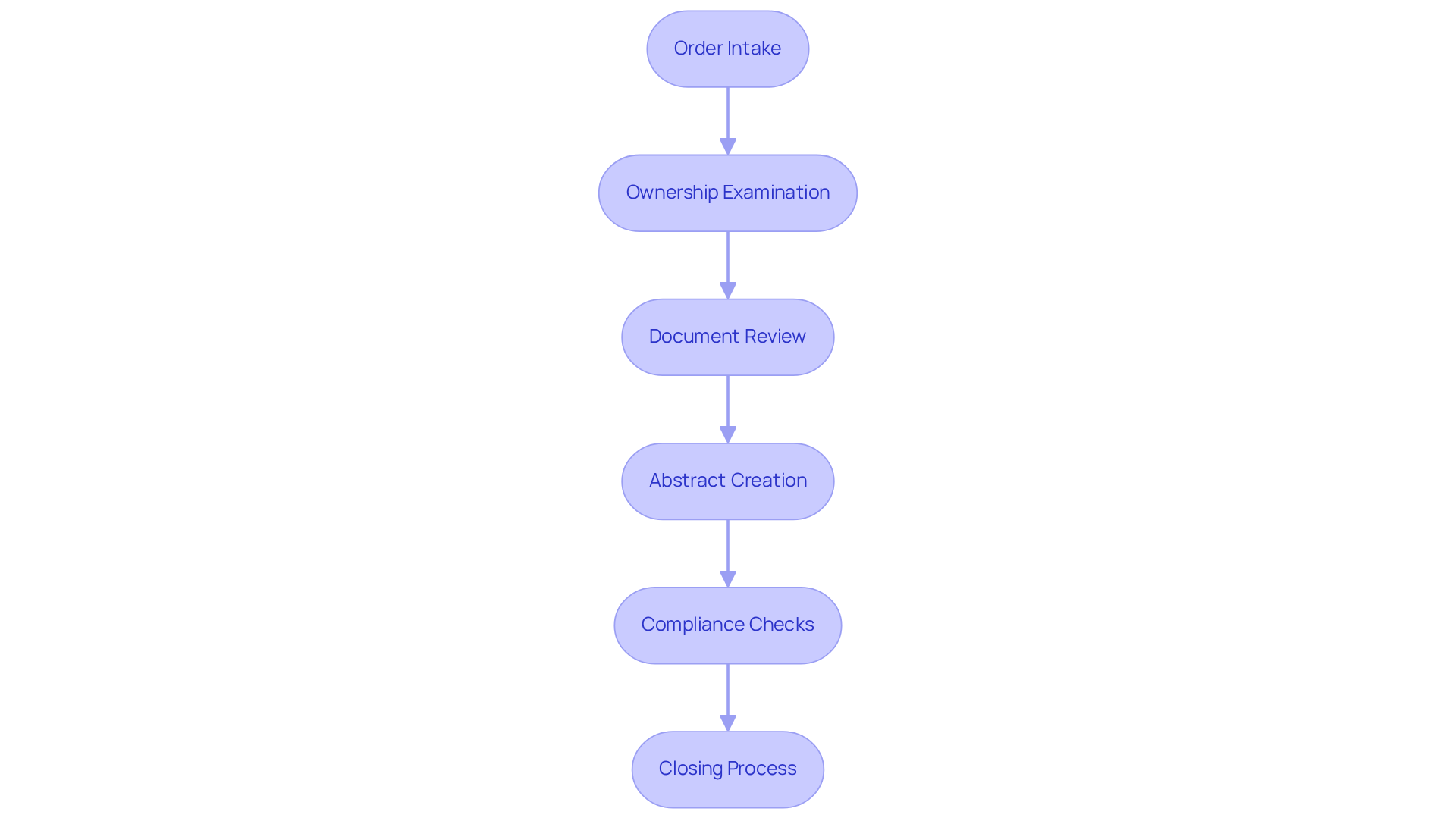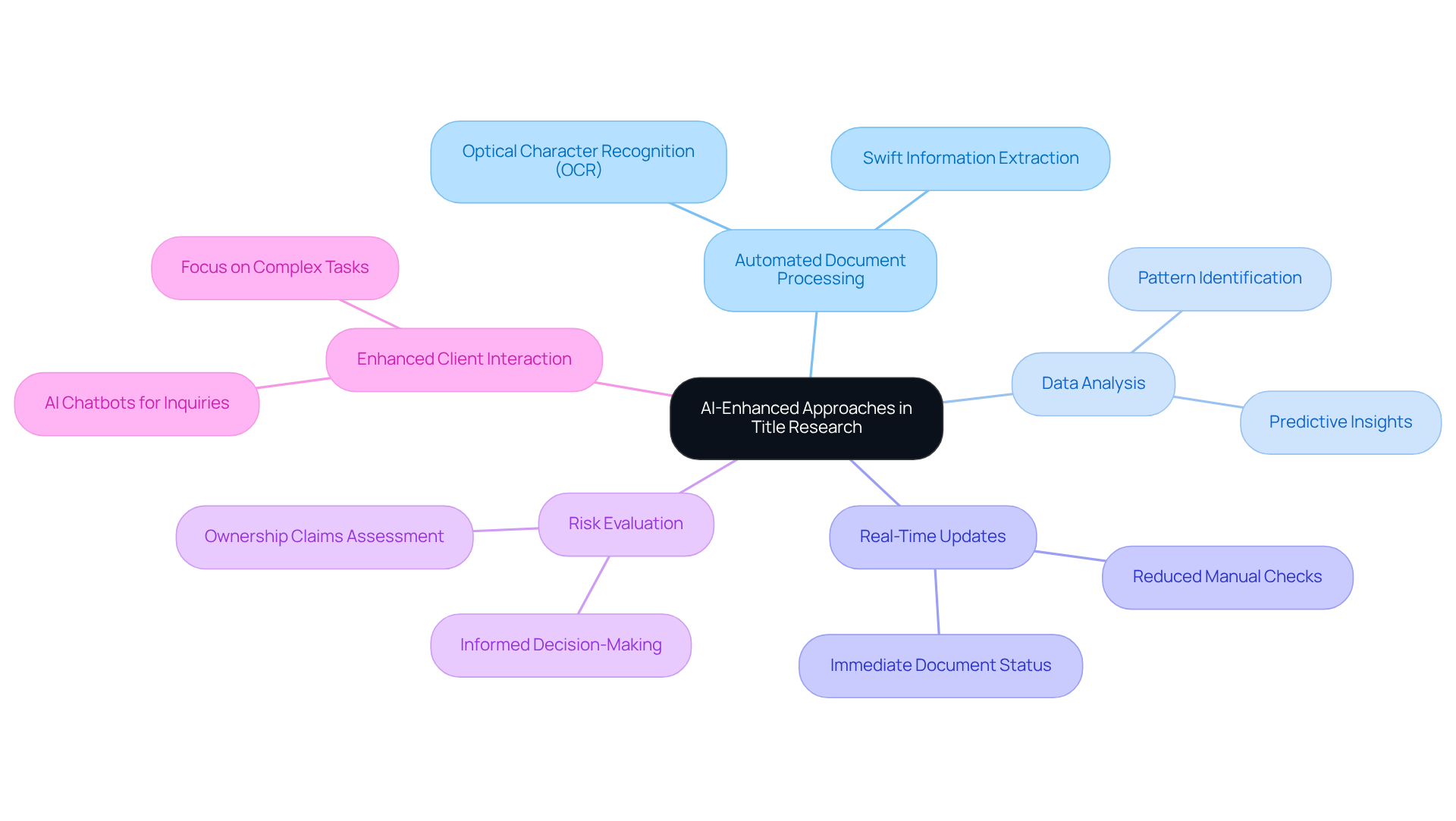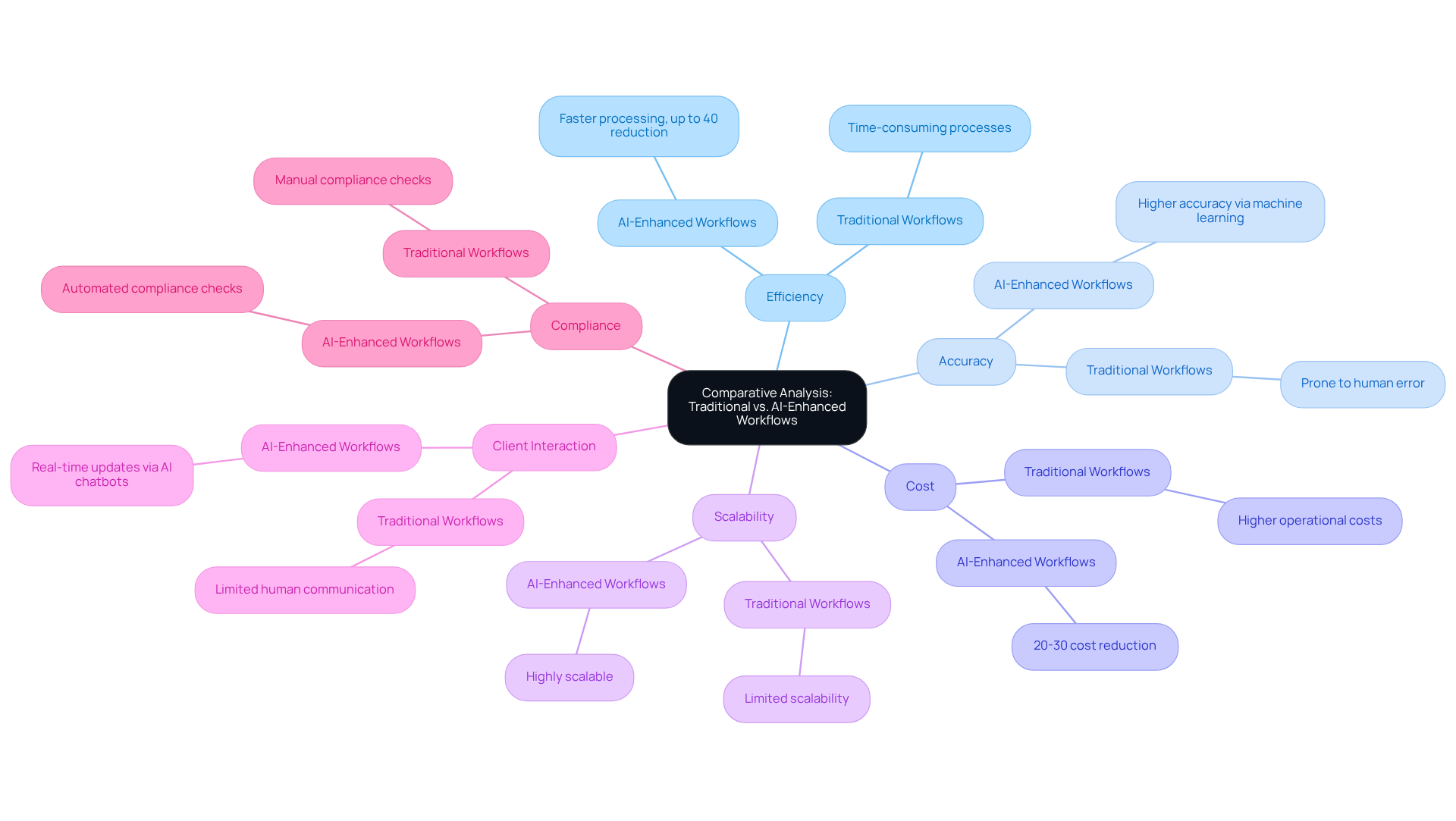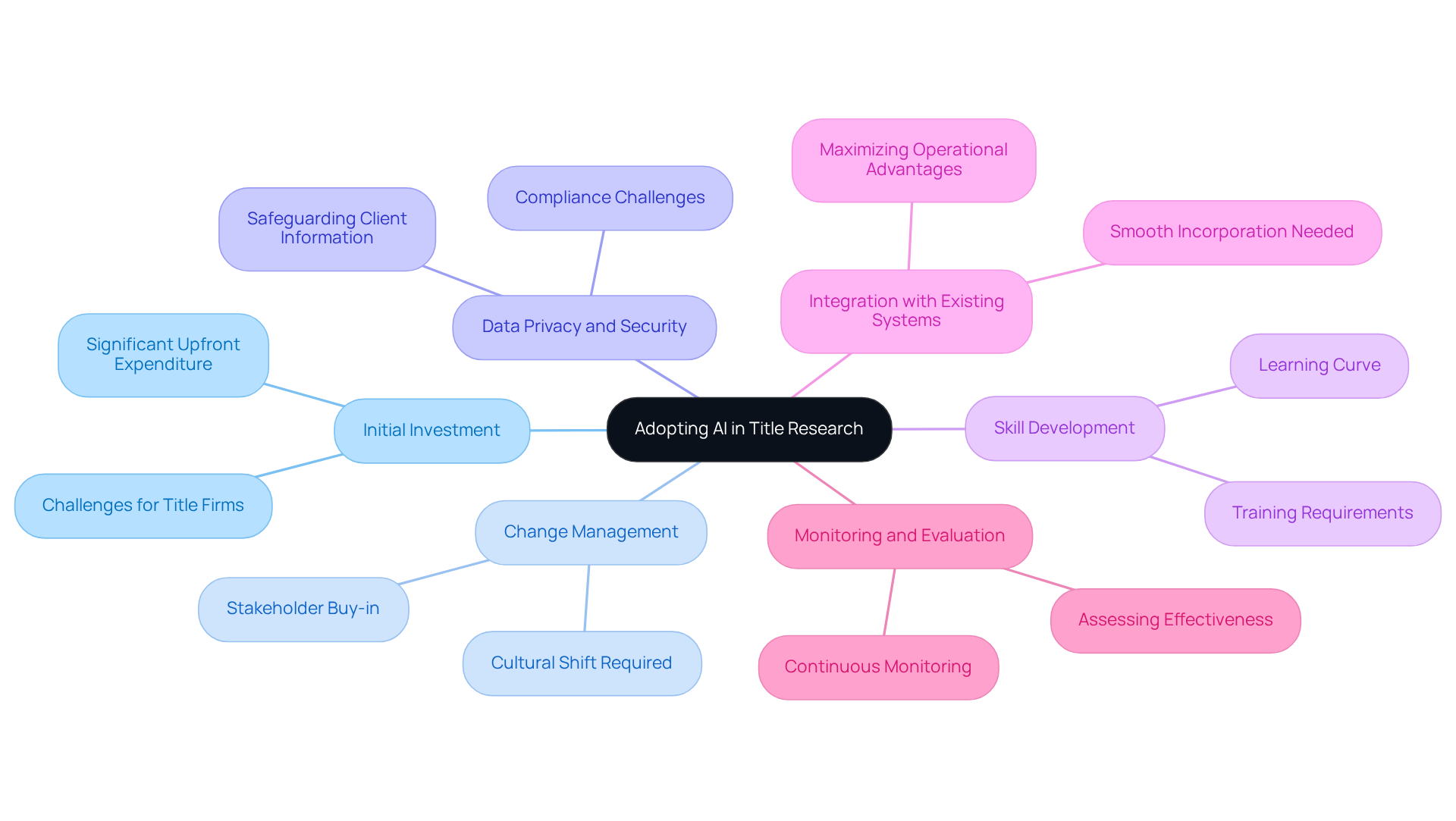Overview
The article delves into the distinctions between traditional title company workflows and AI-enhanced methodologies, underscoring the benefits of integrating AI technologies into title research. It illustrates that AI markedly enhances efficiency and accuracy by automating essential processes such as document handling and compliance checks. Consequently, this innovation tackles existing inefficiencies and significantly lowers operational costs linked to traditional practices.
Introduction
Understanding the intricate workflows of title companies reveals a blend of tradition and innovation that shapes property transactions. The demand for accuracy and efficiency in title research is paramount. As such, the exploration of AI-enhanced methods presents a compelling opportunity for title firms to overcome the limitations of conventional practices. However, the transition from time-consuming, manual processes to automated solutions raises critical questions about implementation, effectiveness, and the future of the industry.
Overview of Traditional Title Company Workflows
Understanding involves recognizing the several critical steps encompassed in conventional company workflows that are essential for ensuring accurate . begins with , where a client submits a request for service related to titles. Following this, understanding title company workflows involves researchers performing thorough searches of public records during the Ownership Examination phase to determine property ownership and recognize any encumbrances. This is succeeded by , which plays a vital role in understanding title company workflows, as researchers meticulously analyze various documents, including deeds, mortgages, and liens, to confirm their accuracy and completeness.
Next, an Abstract Creation step occurs, which is essential for understanding title company workflows by summarizing the findings from the document search into a concise report. This is complemented by , ensuring that all legal requirements are satisfied before proceeding to the , which requires understanding title company workflows to finalize the transaction by preparing closing documents and disbursing funds.
Despite its thoroughness, understanding title company workflows often reveals considerable inefficiencies in this process. Understanding title company workflows is essential because the dependence on manual procedures can result in , with to finalize. For instance, understanding title company workflows may show that traditional workflows involve extensive back-and-forth communication and document handling, which can slow down the overall process. Consequently, firms in the title industry encounter difficulties in satisfying client expectations for prompt service, emphasizing the necessity for understanding title company workflows to improve efficiency and precision in property research. Additionally, Parse AI offers flexible subscription options, including monthly, annual, and pay-as-you-go plans, with customer support available to help tailor solutions that best fit your needs.

AI-Enhanced Approaches in Title Research
harness advanced technologies to significantly boost efficiency and precision. Understanding title company workflows is crucial, as the importance of accurate title research cannot be overstated; it forms the backbone of informed decision-making in property transactions. However, that hinder effectiveness. Fortunately, AI offers compelling solutions that address these issues.
Key components include:
- Automated Document Processing: AI systems can swiftly scan and extract pertinent information from using optical character recognition (OCR).
- Data Analysis: Machine learning algorithms scrutinize historical information to identify patterns and predict potential issues, such as ownership disputes or liens.
- Real-Time Updates: , thereby reducing the time spent on manual checks.
- Risk Evaluation: By examining previous information, AI evaluates risks linked to ownership claims, assisting ownership firms in making knowledgeable choices.
- Enhanced Client Interaction: AI chatbots effectively handle client inquiries, delivering immediate responses and allowing human resources to focus on more complex tasks.
These innovations not only significantly reduce the time required for title searches but also improve overall accuracy, enhancing the understanding of title company workflows and addressing many challenges faced by traditional methods. Consequently, organizations leveraging AI stand to gain in the property sector.

Comparative Analysis: Traditional vs. AI-Enhanced Workflows
Criteria | Traditional Workflows | AI-Enhanced Workflows
------------------------------|-----------------------------------------------|------------------------------------------------
Efficiency | Time-consuming, often requiring several days | through automated data extraction and analysis.
Accuracy | Prone to human error due to manual processes | that continuously improve with data input.
Cost | Higher operational costs due to labor-intensive processes | Average cost reduction of 20-30% from implementing AI, driven by efficiency gains and reduced labor needs.
Scalability | Limited scalability; difficult to manage increased workloads | Highly scalable; AI systems can effortlessly handle large volumes of data, adapting to fluctuating demands.
Client Interaction | Limited to human communication; slower response times | , providing real-time updates and faster responses.
Compliance | Manual compliance checks can lead to oversights | , minimizing the risk of errors and enhancing reliability.
Case Studies | , leading to delays and increased costs. | , allowing researchers to finalize reports more swiftly and precisely. This advancement results in relative to conventional techniques. Furthermore, the platform effectively addresses the challenges of verifying real property ownership, a crucial aspect for ownership researchers.

Implications and Considerations for Adopting AI in Title Research
Adopting AI in title research presents several key implications and considerations:
- Initial Investment: Implementing necessitates a in software and training, which can pose a challenge for some title firms.
- Change Management: to AI-enhanced processes demands a , requiring buy-in from all stakeholders to ensure a seamless transition.
- Data Privacy and Security: Title firms must navigate , ensuring that AI systems adhere to data protection regulations while safeguarding sensitive client information.
- : Employees may require training to effectively utilize , which can involve a substantial learning curve and ongoing support.
- Integration with Existing Systems: with existing processes and technologies is essential for maximizing operational advantages and minimizing disruptions.
- Monitoring and Evaluation: Continuous is crucial to assess their effectiveness, allowing for timely adjustments and improvements.
By thoughtfully addressing these factors, title companies can improve their understanding of title company workflows and successfully transition to , ultimately enhancing their efficiency and service quality.

Conclusion
Understanding title company workflows reveals a significant transformation in the industry, particularly through the adoption of AI-enhanced methods. Traditional workflows involve a series of meticulous steps that ensure accurate property ownership verification; however, they often fall short in efficiency and responsiveness. The shift towards AI streamlines these processes, enhances accuracy, reduces costs, and improves client interaction, marking a pivotal advancement in title research.
The article outlines the various phases of traditional workflows, such as:
- Order intake
- Ownership examination
- Document review
These phases highlight their inherent inefficiencies. In contrast, AI-driven approaches leverage automation and machine learning to:
- Expedite document processing
- Provide real-time updates
- Minimize human error
Consequently, these innovations lead to a substantial reduction in processing times and operational costs, allowing firms to better meet client expectations and adapt to fluctuating demands.
Ultimately, the integration of AI into title company workflows represents a significant opportunity for firms to enhance their operational efficiency and service quality. As the industry evolves, it is crucial for title companies to embrace these technological advancements, considering the implications and necessary adjustments for successful implementation. By doing so, they can not only stay competitive in a rapidly changing market but also redefine the standards of accuracy and responsiveness in property transactions.
Frequently Asked Questions
What are the main steps involved in traditional title company workflows?
The main steps include Order Intake, Ownership Examination, Document Review, Abstract Creation, Compliance Checks, and the Closing Process.
What occurs during the Order Intake phase?
During the Order Intake phase, a client submits a request for service related to titles.
What is the purpose of the Ownership Examination phase?
The purpose of the Ownership Examination phase is for researchers to perform thorough searches of public records to determine property ownership and recognize any encumbrances.
Why is Document Review important in title company workflows?
Document Review is important because researchers analyze various documents, including deeds, mortgages, and liens, to confirm their accuracy and completeness.
What is Abstract Creation in the context of title company workflows?
Abstract Creation involves summarizing the findings from the document search into a concise report.
What do Compliance Checks ensure in the title company workflow?
Compliance Checks ensure that all legal requirements are satisfied before proceeding to the Closing Process.
What happens during the Closing Process?
The Closing Process finalizes the transaction by preparing closing documents and disbursing funds.
What inefficiencies are commonly found in traditional title company workflows?
Common inefficiencies include reliance on manual procedures, delays, mistakes, extensive communication, and document handling, which can slow down the overall process.
How do traditional workflows impact client satisfaction?
Traditional workflows can lead to difficulties in satisfying client expectations for prompt service due to the inefficiencies present in the process.
What solutions does Parse AI offer to improve title company workflows?
Parse AI offers flexible subscription options, including monthly, annual, and pay-as-you-go plans, along with customer support to help tailor solutions that fit specific needs.




